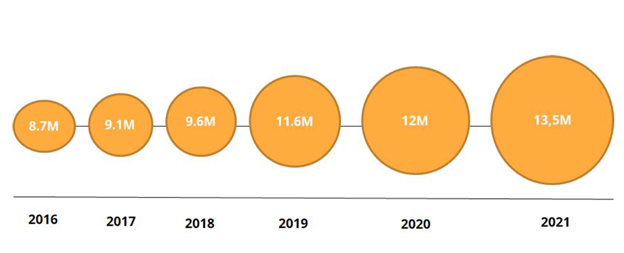AGRIS VIRTUAL ANNUAL CONFERENCE 2021 REPORT

AGRIS Virtual Annual Conference 2021
FAO/AGRIS
AGRIS VIRTUAL ANNUAL CONFERENCE 2021 REPORT
Held online on Thursday 1 July, and attended by 563 participants from 124 countries, the AGRIS Virtual Annual Conference 2021 was a notable success.
The quality of the presentations, the thoughtful contributions of the six invited panelists, the active and lively engagement of the participating attendees with the topic – which was manifested in the form of interesting questions posed to the presenters, as well as networking in the chat forum – contributed significantly to making the conference a memorable and enlightening one.
Evocatively titled "To defeat hunger, knowledge is key and sharing it is vital,” the conference was interpreted live in all six official FAO languages: Arabic, Chinese, English, French, Russian and Spanish. The number of attendees, as well as the live interpretation, marked this as a first for AGRIS.
This focused, half-day event outlined how FAO-coordinated AGRIS promotes the knowledge sharing essential for agricultural innovation and the sustainable transformation of global agricultural and food systems. Along with reviewing the achievements and challenges of the past year, the meeting explored ways in which organizations can partner with and strengthen AGRIS whilst simultaneously benefiting themselves.
Six invited panelists from organizations in Italy, Lebanon, Moldova, Nicaragua, the Russian Federation and Uganda underscored the importance of partnerships in knowledge sharing and the benefits that accrue to organizations that partner with AGRIS.
The conference was divided into three main sessions:
- Introduction to AGRIS: How does AGRIS facilitate knowledge sharing to support the fight against hunger? (Imma Subirats, AGRIS Programme Manager and Senior Information Management Officer, FAO)
- Partnering with AGRIS: How can your organization benefit from AGRIS? (Ilkay Holt, Information Management Specialist, FAO)
- Contributing to AGRIS: How can your organization contribute to AGRIS? (Ilkay Holt and Imma Subirats)
SESSION 1: INTRODUCTION TO AGRIS
The introduction, by Imma Subirats, was structured around what AGRIS is and the ways in which it facilitates the knowledge sharing that is so vital to winning the fight against hunger. After locating AGRIS in the context of FAO and its mission, Imma outlined the history and evolution of AGRIS, along with its general composition, functions, scope and users.
Coordinated by FAO since 1975, AGRIS has been increasingly important in FAO’s toolkit of knowledge programmes that enhance the accessibility and visibility of research products in its member countries and make this knowledge globally accessible and usable, thereby contributing to defeating hunger and achieving the Sustainable Development Goals (SDGs).
AGRIS and its functions
Composed of two main elements – a network of organizations who collect and contribute information about food and agricultural literature and a database with more than 13.5 million structured bibliographic records on agricultural science and technology in over 90 languages, AGRIS:
- is the international information system for agricultural sciences and technology;
- collects bibliographic information from around the world on scientific, technical and socioeconomic publications on a wide variety of topics related to food and agriculture; and
- compiles the information in a rational and systematic way and publishes it in a database – which can be searched through a user-friendly search engine – monthly.
By so doing, AGRIS fulfils its main functions of:
- creating a single, comprehensive database of global agricultural literature that reflects research results in food and agriculture;
- meeting the information needs of its users – who include scientists, researchers, students, librarians and policy-makers – by providing online retrieval mechanisms (and providing advice on accessing documents not available online); and
- interacting with other search engines, thereby increasing search efficiency and hence visibility and accessibility of agricultural scientific research.
In the landscape of agricultural sciences characterized by a significant amount of research being conducted by public organizations or private companies outside the realm of the formal academic peer review process (grey literature), often in languages other than English (the language associated with a significant proportion of scientific literature), the pivotal role in knowledge sharing played by a multilingual database and network such as AGRIS cannot be overstated. A concerted drive to expand the AGRIS database since 2016 has resulted in the addition of 4.8 million new records, see Figure 1.

Figure 1. AGRIS Content Evolution. Source: FAO, 2021.
Interesting snapshots of the AGRIS network, comprising 447 data providers (with another 53 pending), usage statistics and content evolution provided the ideal segue into the short speeches of two distinguished panelists: Justin Chisenga and Enrico Bonaiuti,

Justin Chisenga explained how AGRIS was a public good that served both developed and developing countries and provided
...long term and sustainable solution with a global public domain platform or network through which you could provide continuous access to your institution's agricultural sciences, technology, data or information, participate in data and knowledge sharing activities
My experience in Africa, working on AGRIS and related activities with colleagues in Ministries of Agriculture and related ministries, agriculture research institutes or organizations, and universities has shown me that AGRIS is a huge opportunity as an infrastructure or a network for providing access to agriculture science and technology data and information from developing countries to help generate knowledge, strengthen research capacity and support informed decision-making in the food and agriculture domains in the countries and regions.

Enrico Bonaiuti complimented AGRIS:
As one of the world’s oldest bibliographic databases for agricultural science and technology, the International System for Agricultural Science and Technology (AGRIS) represents a gold-standard in knowledge sharing for agricultural research institutions and organizations worldwide.
Enrico used the example of ICARDA's Monitoring Evaluation and Learning Team (MEL) to emphasize the benefits of partnering with AGRIS:
A vital function of a platform like AGRIS, maintained globally by FAO, through AGRIS many national research institutions and organizations who don’t operate their own institutional repository can still quickly and easily receive support to manage their research findings and store their metadata. Further, AGRIS is suitable for several types of knowledge such as academic papers, grey literature, datasets and more, offering a high flexibility.
For MEL, the AGRIS platform was crucial to support content in different languages, enabling us to expand knowledge sharing across countries and audiences and improve visibility and access to agricultural sciences and the technical content of agricultural research.
SESSION 2: PARTNERING WITH AGRIS
The second session, by Ilkay Holt (FAO), delved into the structure and role of the AGRIS Network – comprising data providers and country hubs – and showcased the ways in which partnering with AGRIS (which receives 10 million views annually) benefited organizations.
The existence of the comprehensive, multilingual and diverse AGRIS database is predicated on the AGRIS network, a global collaborative network (community) of organizations that share bibliographic references. Continued collaboration strengthens multilingualism and enables more equitable and diverse representation of agricultural information in the AGRIS database. The network and the users of AGRIS also provide invaluable feedback that paves the way for new functionalities in AGRIS, thus creating a virtuous cycle of improvements that benefit all stakeholders.
Organizations that join AGRIS, which is free to users and contributors, benefit from:
- being part of a dynamic international network focused on agricultural content that is accessible, intensively used and massively distributed in the global information landscape;
- jointly contributing to international science;
- exchanging information and data between different countries and stakeholders and increasing visibility to a broader international audience;
- sharing unique materials, such as unpublished scientific and technical reports, governmental publications, conference materials, data sets, maps, etc.;
- increasing global visibility (see Figure 2);
- increasing usage of institutional research outputs;
- enabling discoverability on the internet/web;
- offering multilinguality via AGROVOC, the multilingual agricultural thesaurus;
- creating knowledge sharing networks; and
- creating opportunities for further collaboration.

Figure 2. AGRIS Usage Statistics. Source: Google, 2021.
The AGRIS network comprises two elements – data providers and country hubs.
Data providers are organizations that contribute to the content of the AGRIS database. Types of data providers include research centres, academic institutions, publishers, governmental bodies, development programmes, as well as international and national organizations.
Country hubs, formerly known as National AGRIS Centres, act as focal points for AGRIS at country or regional level and are responsible for:
- promoting AGRIS;
- guiding eligible partners on joining the AGRIS Network;
- advising existing and potential organizations on submitting information to AGRIS; and
- coordinating capacity development activities.
Facilitating knowledge sharing and strengthening the AGRIS network through exchanging ideas and learning from each other’s experiences are the ultimate goals of capacity development activities organized by country hubs. Capable of taking many forms – ranging from in-person meetings and calls to virtual conferences, webinars and publications – capacity development activities are integral to a strong, dynamic and collaborative AGRIS.
Capacity development
Prioritizing online activities and webinars, FAO collaborated with country hubs to promote and organize capacity development activities. Two such notable events were:
- The round table organized by the State Agrarian University of Moldova to encourage researchers and institutions in Moldova to use AGRIS for the dual purpose of information consumption and provision – as users and data providers.
- The two-day workshop organized by the Institute Techinformi of the Georgian Technical University, which had participating organizations from Albania, Armenia, Bosnia and Herzegovina, Georgia, Kosovo, Montenegro, Republic of Moldova, Republic of North Macedonia, Serbia and Ukraine.
Future capacity development plans include focused, self-paced online training courses – which takes advantage of FAO’s immense experience in online training programmes – on topics spanning improving metadata quality, making the optimum use of AGRIS and using vocabularies in digital collections.
Available in the six official FAO languages, the AGRIS website or portal offers an environment for Network members to follow the latest activities of AGRIS, share their news and events with the wider community, and to access resources such as guides and help pages to become data providers and use the different features and services of AGRIS.
Viorica Lupu and Ruth Velia Gómez were two panelists who shared with the audience their knowledge and experience of partnering with AGRIS:

Viorica Lupu – Deputy Director at the Republican Scientific Agricultural Library of the State Agrarian University of Moldova. ©C. Plugari
According to Viorica Lupu, AGRIS helped promote Moldovan science globally and offered
the big opportunity for agricultural institutions from the Republic of Moldova to be part of an advantageous and dynamic international network and to contribute to the promotion of Moldovan scientific research globally. Thus, the Republic of Moldova benefits from an open and free service, having the possibility to make its scientific results to be discovered through AGRIS without costs, other barriers and restrictions.
She emphasized that AGRIS opened
agricultural science and research from the Republic of Moldova to a wider audience and contributes to the easier discovery of publications, to increase the visibility of global research and the citation rate of Moldovan authors.

Ruth Velia Gómez also extolled the benefits of partnering with AGRIS:
FAO has been a professional leader in global information management. In the last few years, AGRIS has amazingly revolutionized and strengthened its great mission of sharing and managing knowledge for agricultural innovation.
Working in a network means a lot of commitment and perseverance. AGRIS is a global network that has gone through several stages and with the support of FAO has been able to lead with professionalism the management of information worldwide.
In recent years, AGRIS has amazingly evolved and strengthened its great mission of sharing and managing knowledge for agricultural innovation...The main challenge is to learn more about AGRIS and to ensure that the knowledge generated in our countries is shared and visible to the world for the development of agricultural research.
SESSION 3: CONTRIBUTING TO AGRIS
Jointly presented by Imma Subirats and Ilkay Holt, the third and final session of the conference was devoted to the mechanics of contributing to and using AGRIS, the importance of visibility and multilingualism, and new features and services that enhanced the ease and value of contributing to AGRIS.
Along with explaining the different way organizations could contribute their bibliographic records to AGRIS (email, manual upload and automatic IT protocols), the improved and searchable registry of AGRIS data providers, the way records are displayed in the database, searching the database effectively, as well as new developments that enhanced the discoverability of records, this session elucidated the process and practicalities of registration – including the different sections of the registration form – and underscored different ways in which AGRIS amplifies the visibility of data providers and their collections. For example,
- profiles of data providers, along with their activity status – a new feature introduced recently in cognizance of the fact that AGRIS’ high visibility necessitates up-to-date information about the data providers – and links to their resources, as well newsworthy activities in the network that have been published on the AGRIS website, can be accessed through a special search feature (see Figure 3); and
- data providers can sign up for a service, the institutional dashboard, that enables them to browse their own collections and access their institutional usage statistics.

Figure 3. An example of a data provider’s profile. Source: FAO, 2021.
As the world changes, FAO – and hence AGRIS – also adapt accordingly. The content strategy of AGRIS has evolved over the years to reflect changes in the global information landscape, agricultural research and the needs of stakeholders, be they AGRIS users, data providers or both. This has implications for the bibliographic content in the database – which contains journal articles, monographs, books, book chapters, grey literature (theses, working papers, technical reports), conference reports and datasets – and is manifested in the following ways:
- a shift away from unique repositories to a range of types of information resources – from focusing on library information systems to any automated way to expand the content collection with new items;
- integration of new content types, such as datasets, over the last few years;
- greater focus on quality and pertinent content;
- increased collaboration with data providers – rather than expanding the collaborative network with service providers, AGRIS focuses on primary sources; and
- emphasis on full texts – bibliographic records should provide links to the full text.
Multilingualism
Multilingualism, a fundamental feature of AGRIS, is a consequence of AGRIS’s global reach and international nature – bibliographic records in over 90 languages from around the world are indexed in AGRIS – and simultaneously an endorsement of the need for diversity in languages used in scholarly communication.
The full potential of a multilingual, globally distributed, participatory information system such as AGRIS can only be harnessed by ensuring a certain level of linguistic, conceptual and terminological standardization – the use of certain standards and accepted language and terminology by data providers and users in their interactions with AGRIS. AGROVOC, a multilingual thesaurus, plays a key part in this by providing a common vocabulary for food and agriculture worldwide. By enabling data providers and users to work with more than 39 000 relevant agricultural concepts across 40 languages, AGROVOC empowers AGRIS to transcend technical, geographical, political and linguistic boundaries.
Improving AGRIS
With the ultimate goal of facilitating knowledge sharing, FAO constantly strives to improve AGRIS. Feedback from the network plays an important role in this. It aids in the development of new features (some completed and some ongoing) to:
- improve search functionalities in the database;
- enhance the quality of current bibliographic records;
- improve usability;
- provide greater visibility to AGRIS data providers and their collections; and
- improve the connection with AGROVOC.
The session was concluded by short and enlightening speeches by panelists Lidia Pirumova and Onan Mulumba.

Lidia Pirumova – Deputy Director for Science at the Central Scientific Agricultural Library, Russian Federation.
Lidia Pirumova noted that AGRIS was a unifying tool for cooperation between national centres and stressed the importance of multilingualism.
The corporate creation of the AGRIS database by the FAO member countries ensures a complete reflection of national documentary flows on agriculture, which is extremely important for getting an idea of the state of agriculture in the world and in a particular country. The undoubted advantage and benefit of AGRIS are the means of identification and especially thematic retrieval, thanks to the recently renovated AGROVOC thesaurus.
The AGRIS database is a unifying tool for cooperation between national AGRIS centers, creating the so-called AGRIS community. This is great, because we have become more and more regular to communicate, exchange knowledge, news, technology, just good news.

Onan Mulumba – Head of Agricultural Libraries at Makerere University, Uganda.
Onan Mulumba explained the important role played by AGRIS in the university's information ecosystem and in promoting research collaboration:
...information resources such as AGORA and AGRIS are among the key electronic sources of information for the university. AGRIS directly supports agricultural research at Makerere by providing free access to its publications.
Through the AGRIS network, researchers are able to collaborate with other researchers to accomplish certain research tasks, thus enhancing South-to-South, as well as South-to-North research collaborations.
The presentation used in the conference can be accessed HERE.
We would like to thank our guest speakers for their insightful contributions and also thank the 500-plus attendees for their engaged participation and their comments and questions in the 2021 AGRIS Annual Conference.
Those who are interested in news and updates from AGRIS can sign up for the newsletter. To find out more about AGRIS, please visit the AGRIS website.

